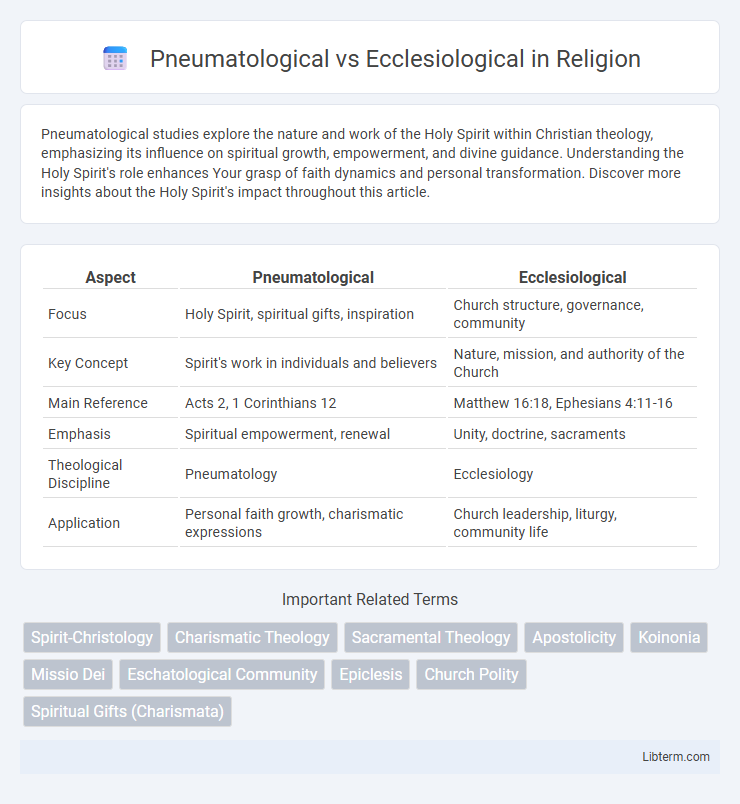Pneumatological studies explore the nature and work of the Holy Spirit within Christian theology, emphasizing its influence on spiritual growth, empowerment, and divine guidance. Understanding the Holy Spirit's role enhances Your grasp of faith dynamics and personal transformation. Discover more insights about the Holy Spirit's impact throughout this article.
Table of Comparison
| Aspect | Pneumatological | Ecclesiological |
|---|---|---|
| Focus | Holy Spirit, spiritual gifts, inspiration | Church structure, governance, community |
| Key Concept | Spirit's work in individuals and believers | Nature, mission, and authority of the Church |
| Main Reference | Acts 2, 1 Corinthians 12 | Matthew 16:18, Ephesians 4:11-16 |
| Emphasis | Spiritual empowerment, renewal | Unity, doctrine, sacraments |
| Theological Discipline | Pneumatology | Ecclesiology |
| Application | Personal faith growth, charismatic expressions | Church leadership, liturgy, community life |
Introduction to Pneumatology and Ecclesiology
Pneumatology studies the person and work of the Holy Spirit, emphasizing His role in inspiration, regeneration, and sanctification within Christian theology. Ecclesiology focuses on the nature, structure, and function of the Church as the body of Christ, addressing doctrines like church authority, sacraments, and community life. Understanding pneumatology provides insight into the Spirit's presence and activity in the church, which is essential for a comprehensive ecclesiological framework.
Defining Pneumatology: The Study of the Holy Spirit
Pneumatology is the theological study focused on the Holy Spirit, exploring its nature, attributes, and role within Christian doctrine and experience. It examines the Spirit's active presence in creation, inspiration of Scripture, empowerment of believers, and guidance in the church. This contrasts with ecclesiology, which centers on the structure, function, and authority of the church as the community of faith.
Ecclesiology Explained: Understanding the Church
Ecclesiology studies the nature, structure, and function of the Christian Church, focusing on doctrines about church authority, governance, and sacraments. It explores key concepts such as the Church as the body of Christ, the significance of church offices like bishops and elders, and the role of community in faith practice. Understanding ecclesiology clarifies how the Church maintains unity, administers sacraments, and fulfills its mission in the world.
Biblical Foundations of Pneumatology
Biblical foundations of pneumatology emphasize the active presence and work of the Holy Spirit as depicted in both Old and New Testaments, highlighting Spirit-inspired prophecy, empowerment for ministry, and intimate communion with God. Pneumatology explores the Spirit's role in regeneration, sanctification, and spiritual gifts, grounded in passages such as John 14:16-17, Acts 2, and 1 Corinthians 12. Ecclesiology, by contrast, focuses on the nature, structure, and mission of the Church, as established in Matthew 16:18 and Ephesians 4, reflecting a communal and institutional dimension rather than the dynamic and experiential presence embodied in pneumatological doctrine.
Scriptural Basis for Ecclesiology
The Scriptural basis for Ecclesiology centers on passages such as Matthew 16:18, where Jesus declares, "You are Peter, and on this rock I will build my church," emphasizing the foundation and authority of the Church. Acts 2:42-47 outlines the early Church's communal life, worship, and teaching, highlighting the Church's function and structure. Ephesians 4:11-16 describes the roles within the Church, such as apostles, prophets, pastors, and teachers, underscoring the institutional and organizational aspects of Ecclesiology grounded in Scripture.
Key Differences: Pneumatological vs Ecclesiological Perspectives
Pneumatological perspectives focus on the role and work of the Holy Spirit in the life of believers and the church, emphasizing spiritual gifts, inspiration, and sanctification. Ecclesiological perspectives concentrate on the nature, structure, authority, and mission of the church as the body of Christ and community of faith. Key differences lie in pneumatology's emphasis on divine Spirit activity versus ecclesiology's concern with institutional organization and church governance.
The Role of the Holy Spirit in Church Life
The Pneumatological perspective emphasizes the Holy Spirit as the divine presence empowering believers, guiding spiritual gifts, and inspiring personal transformation within the church community. Ecclesiological views focus on the Holy Spirit's role in uniting the body of Christ, sustaining ecclesial authority, and fostering corporate worship and mission. Together, these perspectives highlight the Spirit's essential function in both individual spirituality and institutional church life, driving growth, unity, and holiness.
Church Authority: Spirit-Led or Institutional?
Pneumatological perspectives emphasize Church authority as Spirit-led, highlighting the direct guidance of the Holy Spirit in decision-making and spiritual discernment. Ecclesiological views focus on institutional structures, where authority is vested in hierarchical leadership and formal doctrines. This tension shapes debates on whether church governance should prioritize charismatic inspiration or organizational order.
Contemporary Debates: Balancing Spirit and Structure
Contemporary debates in theology highlight the tension between pneumatological emphasis on the Holy Spirit's dynamic and transformative presence and ecclesiological focus on the institutional structure and authority of the church. Scholars examine how charismatic expressions and spiritual gifts coexist with established church governance, seeking a balance that honors both spiritual vitality and organizational order. This dialogue impacts church renewal, worship practices, and leadership models, reflecting ongoing efforts to integrate Spirit-led innovation with ecclesial tradition.
Conclusion: Integrating Pneumatology and Ecclesiology
Integrating pneumatology and ecclesiology enriches the understanding of the Holy Spirit's active role in the life, mission, and unity of the Church. Emphasizing the dynamic interaction between the Spirit's guidance and the Church's communal structure fosters spiritual vitality and doctrinal integrity. This union highlights the necessity of both theological frameworks to fully comprehend the Church's identity and function in Christian theology.
Pneumatological Infographic

 libterm.com
libterm.com